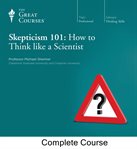Details
PUBLISHED
Made available through hoopla
EDITION
DESCRIPTION
1 online resource (1 audio file (540 min.)) : digital
ISBN/ISSN
LANGUAGE
NOTES
Lecturer: Michael Shermer
Despite our best efforts, we're all vulnerable to believing things without using logic or having proper evidence - and it doesn't matter how educated or well read we are. But there is a method for avoiding such pitfalls of human nature, and it's called skepticism. By using rational inquiry and seeing subjects from a scientific perspective, we can approach even the most sensitive claims with clear eyes to ultimately arrive at the truth. During 18 lectures that will surprise, challenge, and entertain you, you will learn how to think, not just what to think - and you'll come to understand why extraordinary claims require extraordinary evidence. You'll discover how skepticism can help differentiate between real science and pseudoscience, as well as between "scientific" history and pseudohistory - distinctions that have serious educational and political implications. Fascinating case studies illustrate how you can apply the methods of skepticism to detect specious claims and faulty logic in any scenario you encounter such as: The methodology employed by Holocaust deniers Arguments made by proponents of creationism The biology of near-death experiences and the sensed-presence effect Psychic abilities and other "paranormal" phenomena. As you learn how our brains work to form beliefs, you'll examine the classic fallacies of thought that lead us to experience mistakes in thinking and to form bad arguments in favor of our beliefs. Is there a God? Is there life after death? Is there a basis for morality without God? Skepticism 101 doesn't shy away from controversial questions, nor does it give final answers. What it offers are methods and hard evidence for rationally evaluating various claims and positions, and an opportunity to understand why you believe what you believe. All Lectures: 1. The Virtues of Skepticism 2. Skepticism and Science 3. Mistakes in Thinking We All Make 4. Cognitive Biases and Their Effects 5. Wrong Thinking in Everyday Life 6. The Neuroscience of Belief 7. The Paranormal and the Supernatural 8. Science versus Pseudoscience 9. Comparing SETI and UFOlogy 10. Comparing Evolution and Creationism 11. Science, History, and Pseudohistory 12. The Lure of Conspiracy Theories 13. Inside the Modern Cult 14. The Psychology of Religious Belief 15. The God Question 16. Without God, Does Anything Go? 17. Life, Death, and the Afterlife 18. Your Skeptical Toolkit
Mode of access: World Wide Web







